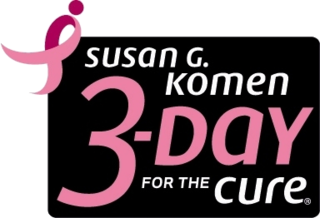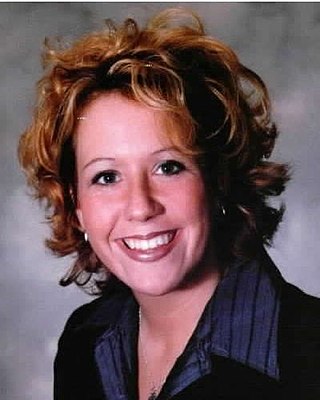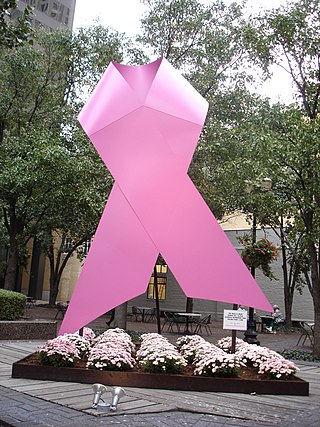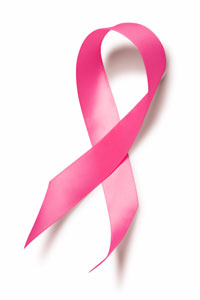Hala Moddelmog became the first female president and CEO of the Metro Atlanta Chamber (MAC) in January 2014, following a career in the corporate and non-profit sectors. Moddelmog has 19 years of career experience in president and CEO roles. Her areas of expertise are strategic planning, marketing, brand and product development, and assembling and managing high performance teams and brand revitalization. Moddelmog is currently the President and CEO of the Woodruff Arts Center, a role she took on in September 2020.
The pink ribbon is an international symbol of breast cancer awareness. Pink ribbons, and the color pink in general, identify the wearer or promoter with the breast cancer brand and express moral support for people with breast cancer. Pink ribbons are most commonly seen during National Breast Cancer Awareness Month.

Yoplait is the world's largest franchise brand of yogurt. It is fully owned by French dairy cooperative Sodiaal since 2021.

The Susan G. Komen 3-Day, frequently referred to as the 3-Day, is a 60-mile walk to raise funds for Susan G. Komen for the Cure and promote awareness to fight breast cancer. Individual participants must raise at least $2,300 to walk 60 miles (96 km) over a three-day weekend.

Susan G. Komen is a breast cancer organization in the United States.

Nancy Goodman Brinker is the founder of The Promise Fund and Susan G. Komen for the Cure. Brinker was also United States Ambassador to Hungary from 2001 to 2003 and Chief of Protocol of the United States from 2007 to the end of the George W. Bush administration. In 2011, she was appointed a Goodwill Ambassador for Cancer Control by the World Health Organization. For her work on breast cancer research, Time magazine named Brinker to its 2008 list of the 100 most influential people in the world. Brinker was awarded the Presidential Medal of Freedom by Barack Obama on August 12, 2009.

Breast Cancer Action (BCAction) is a U.S.-based grassroots education and activist organization driven by and supporting people living with breast cancer. It was founded in 1990 by Elenore Pred, Susan Claymon, Belle Shayer, and Linda Reyes. Based in San Francisco, BCAction is known for understanding breast cancer not as an individual crisis, but a public health emergency, and for their commitment to social justice. The organization's mission is to achieve health justice for all women at risk of and living with breast cancer. BCAction is known for its Think Before You Pink campaign, launched in 2002, which encourages consumers to ask critical questions before buying pink ribbon products and holds corporations accountable for pinkwashing.

Breast Cancer Awareness Month (BCAM), also referred to in the United States as National Breast Cancer Awareness Month (NBCAM), is an annual international health campaign organized by major breast cancer charities every October to increase awareness of the disease and raise funds for research into its cause, prevention, diagnosis, treatment, and cure.
The Triple Negative Breast Cancer Foundation is a nonprofit organization dedicated to raising awareness of triple-negative breast cancer. The foundation supports scientists and researchers in their efforts to determine the definitive causes of triple-negative breast cancer so that effective detection, diagnosis, prevention, and treatment can be pursued and achieved.

The Baltimore Nighthawks are a women's American football team in the Women's Football Alliance. The Nighthawks played their inaugural game in Brooklandville at Martin D. Tullai Field. The Nighthawks played the remainder of their home season at the Baltimore Lutheran School in Towson.
The alcohol industry, also known as Big Alcohol, is the segment of the commercial drink industry that is involved in the manufacturing, distribution, and sale of alcoholic beverages. The industry has been criticised in the 1990s for deflecting attention away from the problems associated with alcohol use. The alcohol industry has also been criticised for being unhelpful in reducing the harm of alcohol.

Team Heather is a fundraising group in the Susan G. Komen for the Cure Global Race for the Cure in Washington, D.C., which has raised over $403,000, since June, 2001, for Susan G. Komen for the Cure and breast cancer research, education, screening, and treatment. Team Heather was formed in 2001 to support 25-year-old Heather Gardner (Starcher) (1976–2002), as she began her fight against breast cancer – a fight that ended on September 29, 2002.
Candy Coburn is an American national performing country music artist who has shared the stage with many notable artists, including Brooks and Dunn, Kellie Pickler, Montgomery Gentry, Blake Shelton, Miranda Lambert, Gary Allan, Josh Turner, Lady Antebellum and others. Scheduled to release her third album in 2010, Candy's most notable contribution to music so far has been her song, "Pink Warrior."
Pinkwashing is a portmanteau word which combines "pink" and "whitewashing". The term is most often used to describe various forms of cause marketing.

Breast cancer awareness is an effort to raise awareness and reduce the stigma of breast cancer through education about screening, symptoms, and treatment. Supporters hope that greater knowledge will lead to earlier detection of breast cancer, which is associated with higher long-term survival rates, and that money raised for breast cancer will produce a reliable, permanent cure.

Pink Ribbons, Inc. is a 2011 National Film Board of Canada (NFB) documentary about the pink ribbon campaign, directed by Léa Pool and produced by Ravida Din. The film is based on the 2006 book Pink Ribbons, Inc: Breast Cancer and the Politics of Philanthropy by Samantha King, associate professor of kinesiology and health studies at Queen's University.

Wacoal is a manufacturer of women's lingerie and underwear, founded in 1949 in Japan by Koichi Tsukamoto. The company has divisions in North America and Europe, and manufactures the brands Wacoal, b.tempt'd, Elomi, Eveden, Fantasie, Freya, Lively, and Goddess.
Gordon B. Mills is the Wayne and Julie Drinkward Endowed Chair in Precision Oncology, Director of Precision Oncology, Director of SMMART Trials and Professor in Cell, Development and Cancer Biology in the Knight Cancer Institute at Oregon Health & Science University.
Phaedra C. Pezzullo is an American author and scholar working as an Associate Professor of Communication at the University of Colorado Boulder. She specializes in environmental communication and rhetoric, public advocacy, tourist studies, and cultural studies.

The colors pink and blue are associated with girls and boys respectively, in the United States, the United Kingdom and some other European countries.











